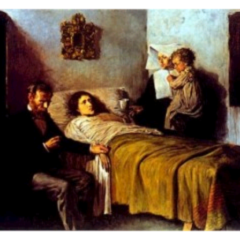William Wang , David C. Kaelber; Rong Xu, et al in an article on JAMA oncology on April 8, have irrefutably highlighted that the mRNA vaccination anti COVID increases the rate of infection, hospitalization, and mortality in cancer patients.
The research, a retrospective cohort study on 2020-2021 vaccinated cancer patients, in the USA, comparing 45 253 vaccinated cancer patients, with 12 common neoplastic diseases including hematological ones, with healthy vaccinated (total sample of vaccinated with two doses of Pfizer or Moderna n=636.435), showed a significant increase in infections, hospitalizations, and mortality in neoplastic patients.
“Among 45 253 vaccinated patients with cancer (mean [SD] age, 68.7 [12.4] years), 53.5% were female, 3.8% were Asian individuals, 15.4% were Black individuals, 4.9% were Hispanic individuals, and 74.1% were White individuals. Breakthrough SARS-CoV-2 infections in patients with cancer increased from December 2020 to November 2021 and reached 52.1 new cases per 1000 persons in November 2021. The cumulative risk of breakthrough infections in patients with all cancer was 13.6%, with the highest risk for pancreatic (24.7%), liver (22.8%), lung (20.4%), and colorectal (17.5%) cancers, and the lowest risk for thyroid (10.3%), endometrial (11.9%), and breast (11.9%) cancers, vs 4.9% in the noncancer population (P < .001). Patients with cancer had significantly increased risk for breakthrough infections vs patients without cancer (HR, 1.24; 95% CI, 1.19-1.29), with greatest risk for liver (HR, 1.78; 95% CI, 1.38-2.29), lung (HR, 1.73; 95% CI, 1.50-1.99), pancreatic (HR, 1.64; 95% CI, 1.24-2.18), and colorectal (HR, 1.53; 95% CI, 1.32-1.77) cancers and lowest risk for thyroid (HR, 1.07; 95% CI, 0.88-1.30) and skin (HR, 1.17; 95% CI, 0.99-1.38) cancers. Patients who had medical encounters for cancer within the past year had higher risk for breakthrough infections than those who did not (HR, 1.24; 95% CI, 1.18-1.31). Among patients with cancer, the overall risk for hospitalizations and mortality was 31.6% and 3.9%, respectively, in patients with breakthrough infections, vs 6.7% and 1.3% in those without breakthrough infections (HR for hospitalization: 13.48; 95% CI, 11.42-15.91; HR for mortality: 6.76; 95% CI, 4.97-9.20)”
The significant increase in infections, hospitalization and mortality in vaccinated cancer patients could be explained in a multifactorial way by the decrease in the immune capabilities of cancer patients due to chemotherapy and the inhibition of immunity made by mRNA vaccines due to the silencing of tumor suppressor genes ( P 53), by the inactivation of microRNAs and by the inhibition of MHC2 necessary for the activation of cellular immunity (e.g. cytotoxic lymphocytes).
The inhibition of immunity is therefore proportional to the number of doses of mRNA vaccines, and immunosenescence and is also caused by atherosclerotic comorbidities. mRNA vaccines expose the population to greater vulnerability to cancer, and infections as highlighted by prof. Giuseppe R. Brera, in his work on the genotoxicity of mRNA vaccines and in his treatise that introduced the antiviral Allostasis and the preventive Immunostimulation to prevent infections by variants of SARS-COV 2.
The only possibility for cancer patients and the population to prevent infections by variants of SARS-COV 2 and increase defenses against neoplasms is antiviral allostasis and preventive immunostimulation also active against all communicable diseases and cancer.
JM WHC Editorial Manager
